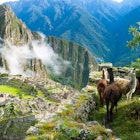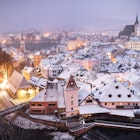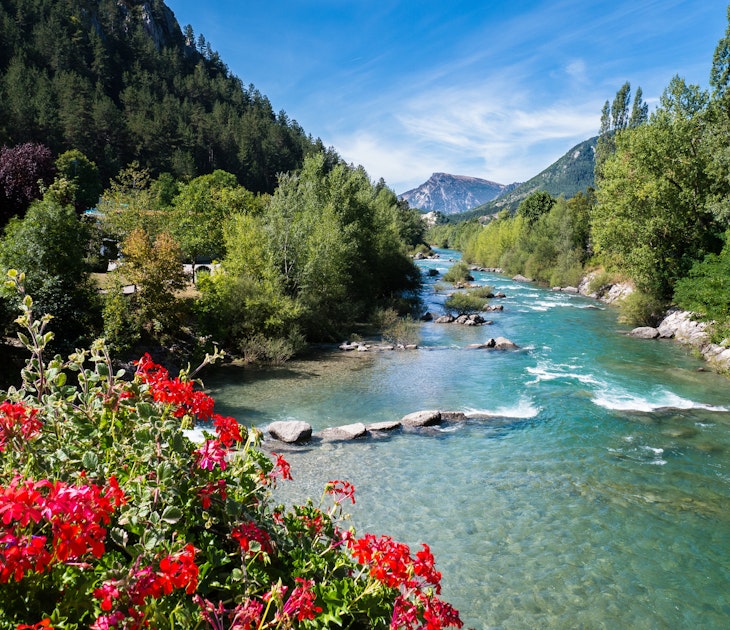

Cycling through a lonely and beautiful Serbia. Beliphotos / Shutterstock
The cycling network вҖ“ a serpentine tangle of paths stretching from the Arctic Circle to the Mediterranean, and from the Atlantic Ocean to the Black Sea вҖ“ first opened in 2001 and launched its 16th route this year. These itineraries crisscross the continent, providing travellers an easy way to enjoy cross-border tourism, construct holiday adventures, and fully drink in the vast, complex, and ever-changing European landscape.
The five routes that cross the Balkan Peninsula, in ·ЎіЬ°щҙЗұиұрвҖҷs southeastern corner, are as dramatic and culturally illuminating as any in the EuroVelo network. Here's how you can explore the best of the Balkans, on two wheels, at human speed, with easy-to-follow signposts along the way.
EuroVelo in the Balkans
The world largely is just now discovering the authentic, texturally rich, raw and unsullied beauty of this region wedged between the Alps and the Adriatic, Mediterranean, Ionian, Aegean, and Black Seas. The bike paths roll down lone country roads, ribbons of seemingly forgotten asphalt. They follow the contours of rivers. They snake up switchbacks and weave through vineyards, fruit tree orchards, and expansive fields of sunflowers.
The five Balkan EuroVelo routes touch nearly every country in the geographic region: Slovenia, Croatia, Bosnia and Herzegovina, Albania, Montenegro, Serbia, North Macedonia, Romania, Bulgaria, Greece, and Turkey. Unique trails mirror the peninsula by providing exceptional diversity in a relatively small area. Cyclists ride along the sea, through the mountains, and along some of the most important rivers in Europe. Along the way are villages and traditions lost to time and tucked into rolling hills where the ancient Greeks, Romans, Ottomans, Venetians, and Austro-Hungarians once roamed.

EuroVelo 6: AtlanticвҖ“Black Sea
The is perhaps the route many associate with the EuroVelo network. It stretches across the continent and 10 countries, west to east, from the Atlantic coast of France to ёйҙЗіҫІ№ІФҫұІ№вҖҷs Black Sea. In between, it connects Switzerland, Germany, Austria, Slovakia, Hungary, Croatia, Serbia, and Bulgaria. Though it spans more than 4400km and necessitates an investment of time, it is relatively flat and follows major rivers, including the Loire, Rhine, and Danube.
The route enters the Balkans from Hungary and drops into Croatia. From there, it takes a left and follows roads, paths, and trails taking riders atop levees and through remote farmland. Though camping is possible, inexpensive pensions вҖ“ which provide a chance to meet locals and eat great meals вҖ“ are prevalent in roadside villages and in the occasional city.
Key Balkan stops along this section of the route include Osijek, Croatia; Belgrade, Serbia; Ruse, Bulgaria; and °дҙЗІФІхіЩІ№ІФЕЈІ№, Romania.
EuroVelo 8: Mediterranean Route
Hugging coastlines from Cyprus to °дГЎ»еҫұіъ, the sea-based spans more than 7500km, crosses 12 countries, and passes 23 Unesco sites. For those without the time or desire to bite off that entire stretch, the nations within the geographic region of the Balkan Peninsula provide a very doable, but still lengthy ride. Cyclist will visit, north to south, Slovenia, Croatia, Bosnia & Hercegovina, Montenegro, Albania, and Greece.
Key Balkan stops along this section of the route include Rijeka, Zadar and Dubrovnik in Croatia; Kotor, Montenegro; Tirana, Albania; and Athens, Greece.

EuroVelo 9: BalticвҖ“Adriatic
Running for 2270km between the Baltic and Adriatic Seas, the is short compared to the others on this list. However, there is a beauty in its density as the route wiggles down through central and eastern Europe. Moving from north to south, the path takes cyclists through Poland, the Czech Republic, Austria, Slovenia, Italy and Croatia.
The tour enters the Balkans in Slovenia. After navigating diagonally across the country through the capital city of Ljubljana and the foothills of the KamnikвҖ“Savinja, Julian, and Dinarica Alps, the route makes a brief visit to Trieste, Italy. Afterwards, the path descends along the Adriatic Sea and the west coast of CroatiaвҖҷs Istrian Peninsula.
Key Balkan stops along this section of the route include Maribor, Slovenia; and ұКҙЗ°щұрДҚ and Pula, Croatia.

EuroVelo 11: Eastern European Route
The route runs from just below the Arctic Circle in Norway all the way down to Athens. Across nearly 7,000km of Europe, the road connects 11 countries and six capital cities.
The EuroVelo 11 drops into the Balkans when it crosses the border from Hungary to Serbia. From there, the trail spans the length of North Macedonia and Greece. And though much of the ride into the Balkans is bucolic and dense with old-world village life, three of the routeвҖҷs six capitals are visited during this last stretch: Belgrade, Serbia; Skopje, North Macedonia; and Athens, Greece.
EuroVelo 13: Iron Curtain Trail
The is the longest route in the EuroVelo portfolio: it extends for some 10,400km, crosses 20 countries, touches three seas, and comes into contact with 14 Unesco sites. It combines flat roads and mountains, major rivers, vineyards, villages, and capital cities as it winds down from the Arctic Circle in Norway to the Black Sea in Turkey.
As the routeвҖҷs name implies, this trail is more than just a path between two points. The ride takes cyclists through the history of 20th-century Europe, when the continent was divided for the better part of five decades by political ideologies. According to the network, the EuroVelo 13 is a вҖҳliving history lesson but also provides a welcome reminder of the peace and reconciliation that have followed the fall of the Curtain.вҖҷ
The route enters the Balkans while hugging the Hungarian border and switching back and forth with Slovenia, Croatia, and then Serbia. In total, eight countries from the Balkan Peninsula are on the EV13, including Romania, Bulgaria, North Macedonia, Greece, and Turkey.
Like this? Try these
Get more travel inspiration, tips and exclusive offers sent straight to your inbox with our . Make sure you're ready for anything with travel insurance from our trusted partners.
https://shop.lonelyplanet.com/products/eastern-europe-travel-guide-14
Explore related stories



 FoodNatural beauty, heritage and wine: 10 idyllic day trips from Dubrovnik
FoodNatural beauty, heritage and wine: 10 idyllic day trips from DubrovnikJun 25, 2019 вҖў 7 min read







